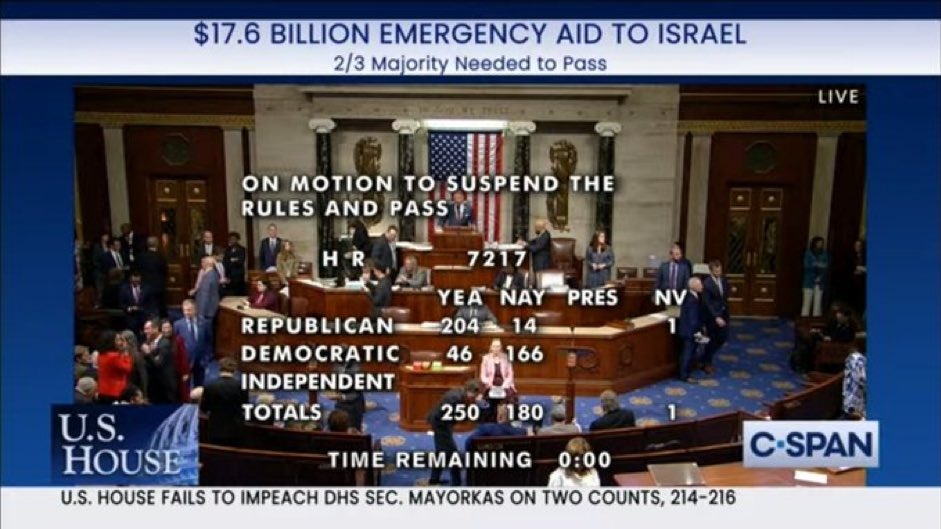House rejects $17.6B standalone Israel aid bill after Biden’s veto threat
The House of Representatives rejected a standalone bill on Tuesday that would provide $17.6 billion in military aid for Israel — an effort the White House blasted as a “political ploy” that would’ve been vetoed by President Biden if it reached his desk.
The legislation was introduced while a broader measure was negotiated between a bipartisan group of senators and the White House linking aid for the Jewish state with $60 billion in military assistance for Ukraine, $10 billion in humanitarian aid for Palestinian territories and $20 billion in new funds for US border security languishes in the upper chamber.
House Speaker Mike Johnson (R-La.) brought the clean Israel funding bill to the floor under a procedure requiring a two-thirds vote from lawmakers to pass.
The measure failed in a 250-180 vote, with 14 Republicans joining 166 Democrats to oppose the bill.
House Democratic leaders signaled their opposition to the proposal in a “Dear Colleague” letter before Tuesday’s vote, calling the standalone bill a “nakedly obvious and cynical attempt by MAGA extremists to undermine the possibility of a comprehensive, bipartisan funding package.”
“We are prepared to support any serious, bipartisan effort in connection with the special relationship between the United States and Israel, our closest ally in the Middle East,” House Minority Leader Hakeem Jeffries (D-NY) and Reps. Katherine Clark (D-Mass.) and Pete Aguilar (D-Calif.) wrote. “Unfortunately, the standalone legislation introduced by House Republicans over the weekend, at the eleventh hour without notice or consultation, is not being offered in good faith.”
“Here at home, the time has come for House Republicans to end the political stunts and come together in support of a comprehensive approach to our national security priorities,” they added.
Their opposition came after the White House Office of Management and Budget issued a statement of administrative policy Monday rejecting Johnson’s effort.
“Instead of working in good faith to address the most pressing national security challenges, this bill is another cynical political maneuver,” the statement said.
“The Administration strongly opposes this ploy which does nothing to secure the border, does nothing to help the people of Ukraine defend themselves against Putin’s aggression, fails to support the security of American synagogues, mosques, and vulnerable places of worship, and denies humanitarian assistance to Palestinian civilians, the majority of whom are women and children,” it continued.
The conservative House Freedom Caucus also opposed the bill over its lack of offsetting spending cuts, which were included in House-approved legislation last November that would have provided Israel with $14.3 billion for its war against Hamas and cut Internal Revenue Service funding earmarked in Biden’s so-called Inflation Reduction Act. That measure failed to pass the Senate.
Never Miss a Story
Sign up to get the best stories straight to your inbox.
Thanks for signing up!
“It is extremely disappointing that the Speaker is now surrendering to perceived pressure to move an even larger but now unpaid for Israel aid package – reversing course on his stance to require new supplemental spending to be offset,” the House Freedom Caucus said in a statement Sunday.
“Conservatives should not be forced to choose between borrowing money to support our special friend Israel or honoring our commitment to end unpaid supplemental spending that exacerbate our nation’s unsustainable fiscal crisis and further risks our ability to respond to future crises.”
Forty-six Democrats and 204 Republicans voted in support of the failed bill, which needed more than 280 affirmative votes to pass.
The bipartisan Senate bill tackling Israel and Ukraine aid and border security appears but certain to meet the same fate as Johnson’s standalone measure.
“It looks to me, and to most of our members, as if we have no real chance here to make a law,” Senate Minority Leader Mitch McConnell said Tuesday.
Former President Donald Trump has derided the bill as a “great gift to the Democrats” and House GOP leadership has also indicated that it is “DEAD on arrival” in the lower chamber.















